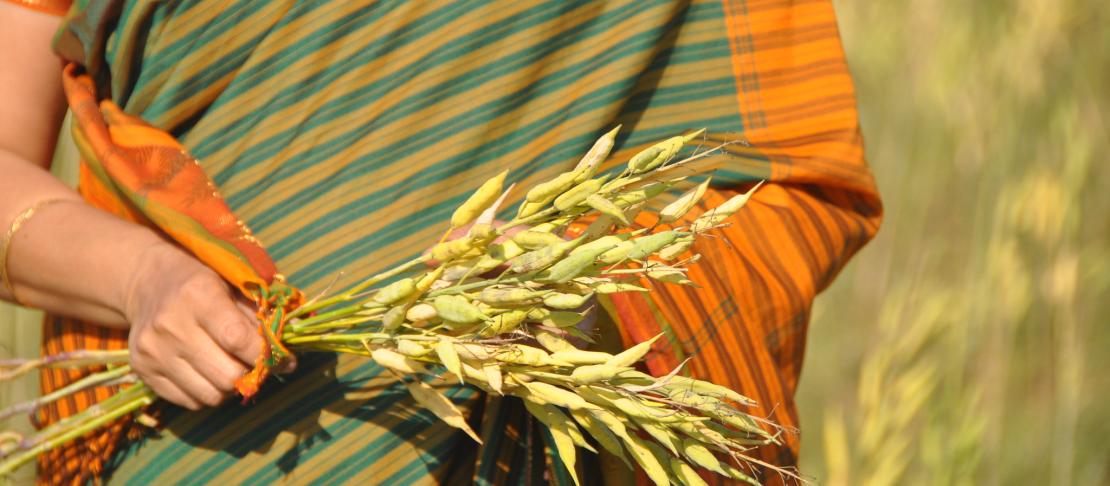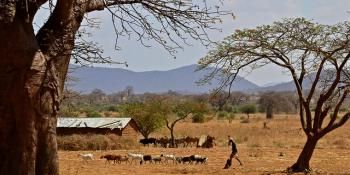Scaling up of Climate-Smart Villages across the 38 districts of Bihar

Summary
Bihar’s agricultural production is affected by droughts and floods. The CGIAR Research Program on Climate Change, Agriculture and Food Security (CCAFS) and International Maize and Wheat Improvement Center (CIMMYT) showcased climate-smart agriculture (CSA) practices to high level government officials in their climate smart-villages (CSV). After this visit, the government of Bihar decided to implement CSA and CSVs in all districts of Bihar. Since, policies are inspired by the local on-farm evidence from the villages and showcased at events organized by CIMMYT and partners. This is expected to help hundreds of thousands small-holder farmers in Bihar improve their nutrition and livelihoods while coping with the droughts and floods.
Background
Bihar’s economy has grown considerably in the last decade, but this growth has been hampered by the volatility of the agricultural sector according to the World Bank. While Bihar has fertile soils and sufficient ground water, its agricultural production is affected by recurring droughts and floods. Strengthening the climate resilience of agriculture is therefore key to the livelihood of the more than 100 million Bihari, especially in the face of climate change.
For this reason, the state government of Bihar has prioritized the strengthening of resilience of agriculture in its policy agenda, seeking measures to diversify production and improve water management. For several years, CCAFS, CIMMYT and other partners have already tested agricultural practices that improve food security, build resilience to climate stresses and reduce emissions in CSVs in Bihar. In the need to address climate change in their agricultural policy plans, Bihar’s Chief Minister, the Agriculture Minister and other senior government officials visited several of these climate-smart villages in 2016.
Consequently, the government of Bihar decided to implement CSA and CSV in all 38 districts of Bihar. Ever since, numerous events have been organized by CIMMYT, the Borlaug Initiative for South Asia (BISA) and other partners to assist the government of Bihar with their policy agenda ‘the Krishi road map’. These events highlight the benefits of practices such as direct-seeding, site-specific nutrient management and weather forecasting, and have already attracted hundreds of farmers and representatives of NGOs, companies and the government. In total, the policies inspired on the CSVs are expected to help hundreds of thousands small-holder farmers in Bihar improve their nutrition and livelihoods while coping with climate risks.
Key facts
- The state government of Bihar prioritized strengthening the climate resilience of agriculture.
- CCAFS and its partners showcased CSA practices to high-level government officials.
- The state government of Bihar decided to implement CSA and CSVs in all the 38 districts of Bihar.
Lessons: Key elements of success
- CSA answered the need for practices sought by the Bihari government to improve the climate resilience of its agriculture.
- CSVs and agricultural research sites in Bihar enabled the showcasing of effective practices in local conditions.
- A combination of on-farm evidence and high-level meetings led to the scaling up of CSVs across Bihar.
Further reading
- CIMMYT news: Participatory scaling of climate-smart agriculture
- Blog: Bihar agriculture minister visits climate-smart villages
- Training material: Framework Guidelines and Governance for Designing Local Adaptation Plan of Action to Mainstream Climate Smart Villages in India
- 2016 Annual Report story: Thousands of villages in South Asia partner with CCAFS to become climate-smart hotspots
Related research outputs
- Journal article: Coping with weather adversity and adaptation to climatic variability: a cross-country study of smallholder farmers in South Asia
- Journal article: Climate Change and Agriculture: Adaptation Strategies and Mitigation Opportunities for Food Security in South Asia and Latin America
- Journal article: Economic benefits of climate-smart agricultural practices to smallholder farmers in the Indo-Gangetic Plains of India
- Journal article: Seven years of conservation agriculture in a rice–wheat rotation of Eastern Gangetic Plains of South Asia: Yield trends and economic profitability
- Journal article: Prioritizing climate-smart agricultural land use options at a regional scale


